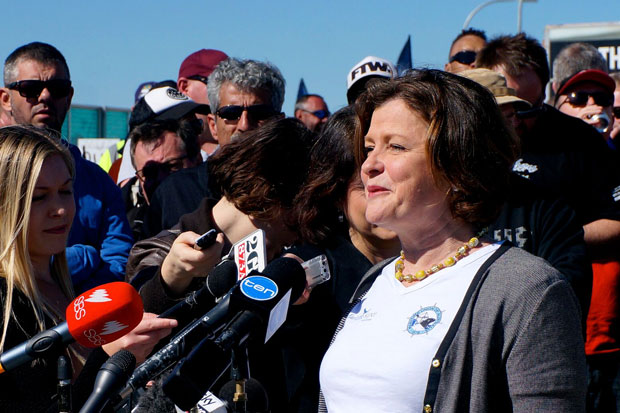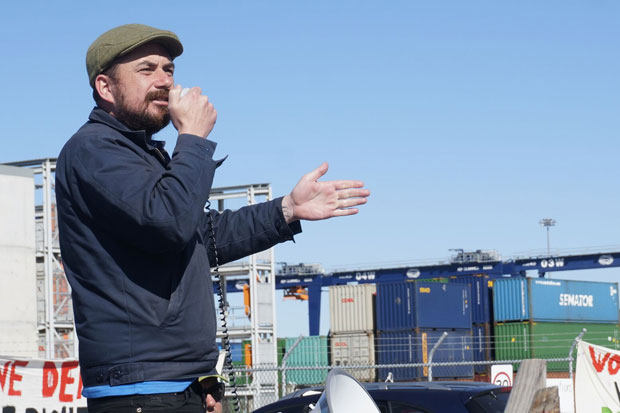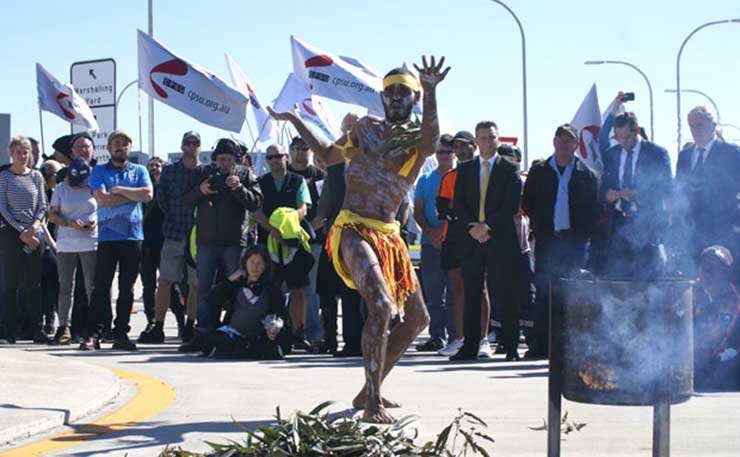The concrete roundabout at Gate B150, at Sydney’s Port Botany, is walled in by cranes, shipping containers and for the past week and a half, unionists and their supporters, who’ve planted their flags in its uncompromising surface.
The proprietor of Gate B150 — Hutchison Ports Australia — sacked nearly half of its workforce two Thursdays ago. Just under 100 people, working at ports in Brisbane and Botany, were made redundant, without notice, by a text message telling them to check their emails, which in turn told them they’d been sacked, “effective immediately”.
It came through at five minutes to midnight.
Many of the workers were rostered to the morning shift in six hours. They were told their possessions would be couriered to them, and a security lock-out was soon preventing workers from accessing the site.
Inevitably, the wharfies are drawing comparisons to the infamous Patricks dispute, which saw the Howard government conspire with a stevedore company to sack its entire workforce overnight, and replace them with non-unionised labour.
The first person I spoke to when I arrived at Port Botany, on the Thursday night one week after Hutchison’s midnight sackings, was a retired wharfie who spun yarns about how, in the late 60s and early 70s, he’d shovelled the last coal into ageing ships soon to be superseded.
A salt of the earth bloke, going through chemo with a shock of white hair and an incredulous chuckle, he didn’t understand how Australia’s industrial relations framework could allow 97 workers to be discarded as though they were some redundant technology, no longer required for the bosses’ profits.
He’d been camping out in his four-wheel-drive for more than a week, primed to lie down on the picket line that had sprung up out of sentiments like his.
Like the hundreds of others who’ve cycled through the community assembly since the dispute flared up on August 7 — the builders, teachers, nurses, public sector workers, bus drivers, students, truckies, sparkies, health service workers, and other community and union members who rushed to defend Hutchison employees — he wasn’t having a bar of it.

So far, that old timer hasn’t been dragged off by police, because the Federal Court rescinded the midnight sackings on Thursday, a week after the dispute erupted. The injunction came down the same day Fairfax media revealed that the man tasked with uncovering corruption in the union movement, Justice Dyson Heydon, had been billed as the star speaker at a Liberal party fundraiser.
Speaking on Friday this week, the day after the credibility of the Royal Commission suffered a terminal blow, Ged Kearney, the President of the Australian Council of Trade Unions, addressed the sacked workers at Port Botany.
“We’ve known all along it is nothing but a political witch hunt and a tool for Tony Abbott to attack not only me, or not only Paddy [Crumlin, the Maritime Union’s National Secretary], but you, because you are the union movement,” Kearney said.
“He is attacking the union movement, and he is attacking you, through the Royal Commission, because he doesn’t want you to do what you’ve done here over the last few weeks; he doesn’t want you standing up for decency and dignity in the way that you have.”
In fact, the only time the Abbott government has really stood up and spoken over the midnight sackings is when the Employment Minister, Eric Abetz, said that sacking workers by text could be an “appropriate methodology”.
On the Friday night news bulletin, a full 16 hours after the text message sackings, Abetz said that “if the culture is that employees can text message the boss and they in fact expect the boss to text message them, then [sacking workers by text]may be the appropriate methodology”.
If Abetz were interested in what had happened to the 97 workers — 40 at Port Brisbane and 57 at Port Botany — it would not have been difficult to find out. Less than 20 minutes after Abetz’ comments were aired on ABC’s nightly news, the Sydney Branch Secretary of the Maritime Union of Australia, Paul MacAleer, explained the situation on the same channel.
“We’ve been having discussions with Hutchison over the last fortnight; they’ve said that they’ve got significant contractual issues, they’re losing work and therefore they’ve got to make people redundant,” MacAleer said.
Requests for information during that negotiating period had gone unanswered, he said, and the Maritime Union of Australia had since discovered that Hutchison “haven’t lost any work, they’ve actually subcontracted it out”.
If people need to be made redundant, MacAleer said, the MUA would ensure that there’s a reasonable process around that, and that the company negotiates and provides the union, which represents 100 per cent of Hutchison’s workforce, with the facts.
On the Thursday night I arrived at Port Botany, one week on, workers were still in the dark about why Hutchison had done this to them. Many of them had gone to the pub — to celebrate the Federal Court temporarily giving them their jobs back — but nobody felt any more secure.
Huddled with members around a 44-gallon drum fire late that Thursday, the wharfies’ union Assistant National Secretary, Warren Smith, put it this way:
“They give, they take. We should be aware they aint’ gonna pick up the blokes they sacked.
“As soon as they don’t pick up, we’re bluing again.
“We’ll go back on our terms, not theirs.”
The terms of negotiation with Hutchison, many of the sacked workers and their supports feel, are inherently stacked in the company’s favour; a fact exemplified by the Fair Work Commission issuing an interim order against the strike which, although not listened to, ordered the workers which remained back to work.

The strength of opposition that’s erupted out of Hutchison’s callousness comes not from the flawed industrial relations system — and not from the Parliamentary Labor Party that, to be fair, has consistently voiced its support for workers since the sacking — but from the hundreds of community members and their unions that have drawn a line in the sand and braved the unseasonably cold winter to fight for fairness.
Labor Party MPs — including Shadow Employment Minister Brendan O’Connor and Opposition Leader Bill Shorten — have made appearances at the picket, but many of the workers felt the little security they have comes almost solely from the weight of numbers at the community assembly outside Hutchison Ports.
The MUA’s former National President and Sydney Branch Secretary, Jim Donovan, summed up what many people were feeling when he addressed the crowd that had gathered in Sydney on Friday.
“When the Libs get in — the Coalition — they take away everything that we’ve won over the last 20, 30, 40 years; [so]we back the Labor party to get in, because they’re the biggest party supporting the workers; we back them to go in and all that, change those laws to back where they came from.
“But what do they do?
“They only give us about 10, 15, 20 per cent of what the they took off us.
“We can continue to go around in this vicious cycle forever and ever [but]we’ve got to get people in Parliament that are going to represent the workers.”
Later this week, the Labor Party will have its chance to support a Greens motion calling for the right to strike, and for changes to the Fair Work Act that give the Fair Work Commission more room to find in favour of workers’ rights to take industrial action if the bosses have acted unfairly and instigated a dispute.
One bloke I spoke to — an employee of Hutchison Ports Australia, punted by the midnight message — said that it would be a test of where they really stood.
Like Donovan — who belatedly added Labor Senator Sue Lyons after being reminded that she was in the crowd — he named Senators Doug Cameron and Lee Rhiannon as the only two Parliamentarians who really stood up to defend workers’ rights to dignity and fair treatment.
And like MacAleer, the sacked worker saw the dispute as being symptomatic of an appalling power imbalance aided and abetted by current workplace laws.
Pointing to the security line Hutchison had established, MacAleer said on Friday that “for a week we’ve been saying we’re not going to be stood over by these no good thugs here”.
“They’ve continued to hold that line, not only against decency, not only against justice and all things good, but even against the Federal Court,” he said, referencing the fact that Sydney workers were locked out of their 6am shift that day despite the redundancies being reversed.
“That just goes to show how low these parasites are, how low this company is.
“The multi-billionaire that owns Hutchison doesn’t have to abide by the Enterprise Agreement, because he’s got too much money and he doesn’t care.
“He doesn’t have to abide by the Fair Work Act, because he’s got too much money and he can pay his little thugs to stand out the front for as long as he’s willing to pay them, and as long as they’re willing to cop his dirty, filthy money.
“…We shouldn’t have to stand on picket lines or at assemblies around the clock eating sausages every day of the week. We should have justice, and we should have legislation that protects our rights…
“They don’t have to abide by the Federal Court, they don’t have to abide by nothing.
“You know why? Because they’ve got money, and they’ve got the coppers, and they’ve got everybody, and you know what we’ve got? We’ve got each other, and that’s all that matters.”
The company has not responded to requests for comment since Thursday.
* As a result of the Federal Court injunction, Hutchison Port workers went back to the job on Friday afternoon in Sydney, and Friday morning in Brisbane. Court proceedings, along with Fair Work Commission hearings, will continue in coming weeks. The community assemblies remain in place.
Donate To New Matilda
New Matilda is a small, independent media outlet. We survive through reader contributions, and never losing a lawsuit. If you got something from this article, giving something back helps us to continue speaking truth to power. Every little bit counts.





